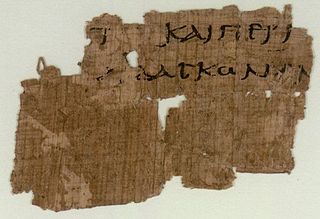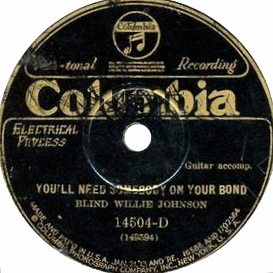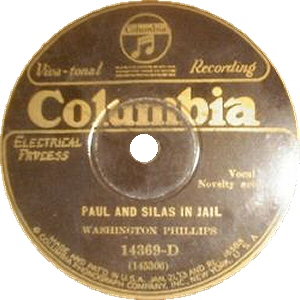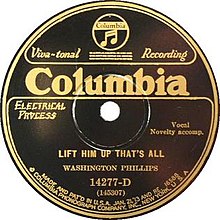
George Washington "Wash" Phillips was an American gospel and gospel blues singer and instrumentalist. The exact nature of the instrument or instruments he played is uncertain, being identified only as "novelty accompaniment" on the labels of the 78 rpm records released during his lifetime.

Matthew 3 is the third chapter of the Gospel of Matthew in the New Testament. It is the first chapter dealing with the ministry of Jesus, with events taking place some three decades after the close of the infancy narrative related in the previous two chapters. The focus of this chapter is on the preaching of John the Baptist and the Baptism of Jesus.

Matthew 4 is the fourth chapter of the Gospel of Matthew in the New Testament of Christian Bible. Many translations of the gospel and biblical commentaries separate the first section of chapter 4 from the remaining sections, which deal with Jesus' first public preaching and the gathering of his first disciples.

"You'll Need Somebody on Your Bond" is a gospel song that is attributed to both tradition and to gospel blues musician Blind Willie Johnson. Johnson first recorded the song in December 1930, although Delta blues musician Charley Patton recorded a similar "You're Gonna Need Somebody When You Die" in October 1929. Over the years, several other musicians have recorded renditions of the song.

"In My Time of Dying" is a gospel music song by Blind Willie Johnson. The title line, closing each stanza of the song, refers to a deathbed and was inspired by a passage in the Bible from Psalms 41:3 "The Lord will strengthen him upon the bed of languishing, thou wilt make all his bed in his sickness". Numerous artists have recorded variations, including Bob Dylan and Led Zeppelin.

"John the Revelator" is a gospel blues call and response song. Music critic Thomas Ward describes it as "one of the most powerful songs in all of pre-war acoustic music ... [which] has been hugely influential to blues performers". American gospel-blues musician Blind Willie Johnson recorded "John the Revelator" in 1930. Subsequently, a variety of artists, including the Golden Gate Quartet, Son House, Depeche Mode, Jerry Garcia Band, The White Stripes, The Forest Rangers, The Sword, have recorded their renditions of the song, often with variations in the verses and music.

Psalm 96 is the 96th psalm of the Book of Psalms, a hymn. The first verse of the psalm calls to praise in singing, in English in the King James Version: "O sing a new song unto the Lord". Similar to Psalm 98 and Psalm 149, the psalm calls to praise God in music and dance, because he has chosen his people and helped them to victory. It is one of the royal psalms praising God as the King of His people.
"Jesus Met the Woman at the Well" is a traditional gospel song. It relates the story of the meeting between Jesus and the Samaritan Woman, found in the Gospel of John at 4:4-26.

"Bye and Bye We're (or, I'm) Going to See the King" is a Christian song from the African-American musical tradition. It is known by a variety of titles, including "I Wouldn't Mind Dying (If Dying Was All)" and "A Mother's Last Word to Her Daughter". It was recorded seven times before 1930, using the preceding titles.
A. C. (also, "Asey" or "Asa") Forehand and (Blind) Mamie Forehand were husband and wife American gospel musicians. They recorded four songs for Victor Records in 1927. A. C. is credited with the two songs recorded on February 25, and Mamie with the two recorded on February 28 – according to which one of them sang, but both played on all four: A. C. guitar and harmonica, Mamie an instrument variously identified as triangle or finger cymbals.

"Leave It There" is a Christian hymn composed in 1916 by African-American Methodist minister Charles A. Tindley. It has become popular enough to have been included in 12 hymnals; and even to be attributed to "traditional" or "anonymous". The title is sometimes given as "Take Your Burden to the Lord and Leave It There" or as "Take Your Burden to the Lord" or as "Take Your Burden", words taken from the song's refrain; the plurals "burdens" and "them" are sometimes used, and "God" instead of "the Lord":
"Denomination Blues" is a gospel blues song composed by Washington Phillips (1880–1954), and recorded by him in 1927.

"Mother's Last Word to Her Son" is a gospel blues song written by Washington Phillips (1880–1954) and recorded by him in 1927.

"Paul and Silas in Jail" is a gospel blues song written by Washington Phillips (1880–1954), and recorded by him in 1927.

"I Am Born to Preach the Gospel" is a gospel song recorded in 1928 by Washington Phillips in gospel blues style. His recording is included in the soundtrack of the 2009 movie My Son, My Son, What Have Ye Done?.

"I've Got the Key to the Kingdom" is a gospel blues song recorded in 1929 by Washington Phillips.

"I Had a Good Father and Mother" is a 1929 gospel blues song by Washington Phillips. The song has sometimes been covered as "I Had a Good Mother and Father"; or with, in both cases, "Real" inserted before "Good".

"If It Had Not Been For Jesus" is an American Christian hymn of unknown authorship. It was included in four hymnals published between 1905 and 1938. The title is taken from the first line of the refrain. An alternative title is the first line of the first verse, namely "I Was a Deep Dyed Sinner". The song is unusual in that it is in triple metre, with three beats to the bar. That suggests that the song may have been composed by an individual whose name has been lost, rather than being ascribable only to "traditional".
"You Can't Stop a Tattler" is a gospel blues song, written by Washington Phillips (1880–1954) and recorded by him for Columbia Records in 1929. The song is in two parts, intended to occupy both sides of a 10-inch 78 rpm record. However, it remained unreleased for many years. Part 2 was included on the 1971 album This Old World's in a Hell of a Fix. Both parts were included on a 1980 compilation album of songs by Phillips, Denomination Blues.















